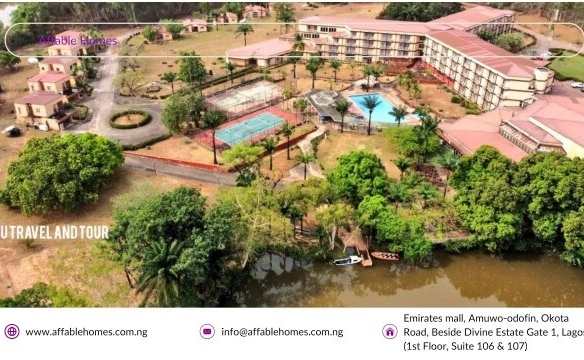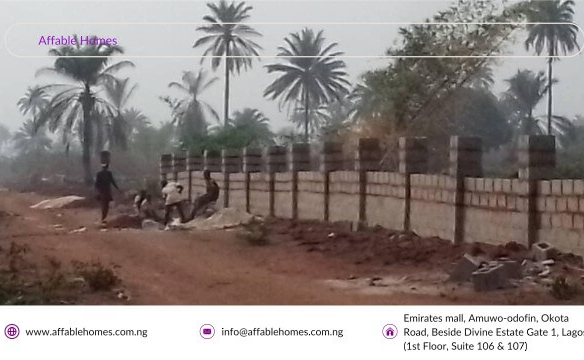Is there a way you as a real estate investor can protect yourself from property fraud in Ibusa? The answer is yes. Buying properties is a capital-intensive venture. In this industry, where property prices run into millions of naira, the last thing you want is to lose your hard-earned money to fraudsters.
Instead, you want to be able to tell genuine properties from fake ones. Or differentiate between authentic real estate agents from fraudsters who are out to deceive and scam people.
While it’s important for everyone to know how to protect themselves from property fraud, it’s even more important if you’re currently on the verge of buying a property in Ibusa.
If this is you, you’re at the right place. In this article, we will give you all the inside tips that will help you protect yourself from scammers. With this, you can ensure your money and property are secure in this beautiful part of Delta State. Let’s get on it.
How to Protect Yourself From Property Fraud in Ibusa, Delta State
Here’s how to stay on top of your real estate transactions without getting scammed.
1. Understand the Market
Before committing your money to any property deal, a good way to protect yourself from fraud is to familiarize yourself with the real estate market in Ibusa. Yes. Ask questions. Talk with locals. Speak with reputable real estate agents.
Generally, get a feel of what is obtainable in this market. Also, find out about property prices in the area and compare them to what you’re being offered.
Fraudsters often bait unsuspecting buyers with unbelievably cheap offers. For instance, if a piece of land in Ibusa typically costs ₦3 million, but someone offers it to you for ₦800,000, that’s a major red flag.
To be on the safe side, understand the market dynamics so you will be able to spot scams early.
2. Verify Property Ownership
One of the most common forms of property fraud in Ibusa is selling lands or houses that the seller doesn’t actually own. It’s not uncommon to find fraudsters trying to lure unsuspecting buyers into buying non-existent properties.
The end result is that such buyers lose their money in the process. To avoid this problem, always insist on seeing the original title documents of the property, such as:
- Certificate of Occupancy (C of O): This proves government approval of land use.
- Deed of Assignment: This transfers ownership from the seller to you.
- Survey Plan: This indicates the land’s boundaries and location.
Take these documents to the Ministry of Lands and Surveys in Delta State to confirm authenticity. A common scam involves fake or duplicated certificates, so this step is very important.
Also Read:
- 10 Simple Questions to Ask Before Buying Land in Badagry
- Follow This To Verify Your Land Ownership in Ofada Owode
- The 5 Best Places to Buy Land in Anambra as a Nigerian in the Diaspora
3. Work with Trusted Professionals
This should be a no-brainer but some people insist on carrying out their real estate transactions by themselves. While that in itself is not bad, authentic real estate professionals can be lifesavers.
So, plan to work with such people instead of doing things all alone. And when you decide to use professionals, avoid working with random individuals or unregistered agents.
Avoid “agents” who operate without formal registration. Look for established real estate firms in Ibusa with good track records. This is because licensed agents are more likely to follow legal procedures and offer transparent deals.
In addition, hire a real estate lawyer who will guide you through the legal process. A lawyer can detect discrepancies in documents and identify potential risks.
4. Conduct Land Searches and Surveys
If you’re buying land, a land search at the local land registry is non-negotiable. This ensures that:
- The land is free from government acquisition.
- There are no ongoing disputes over the property.
- The land belongs to the seller.
To get this done properly, we advise that you engage the services of a registered surveyor to verify the land’s coordinates and ensure it matches the description in the documents provided.
Since fraudsters in Ibusa might likely sell the same parcel of land to multiple buyers, it’s important to do a thorough verification.
5. Beware of “Omonile” Tactics
In Ibusa, like many parts of Delta State, the “Omonile” issue (land grabbers or local family heads claiming rights over land) is prevalent.
Fraudsters may pose as family representatives and demand payment for land you’ve already legally acquired.
They may even claim that they have a property to sell. When you pay for such properties, you find out that it is a family property or that it has certain encumbrances that will lead to legal complications in the future.
To avoid falling victim:
- Ensure you buy directly from the rightful family or their verified representative.
- Get a signed agreement with witnesses, including community elders, to prevent future disputes.
- Make sure you verify all the documents and land titles the land should have.
6. Request for an Encumbrance Check
An encumbrance check reveals if the property has any legal liabilities, such as unpaid loans or pending litigation.
Fraudsters often sell encumbered properties, leaving unsuspecting buyers with legal battles. Hopefully, you’ll be careful enough to avoid this.
To make the process smoother, get a real estate lawyer who can help you obtain this information from the land registry.
7. Conduct Physical Inspections
It’s true we are in the internet and social media era where you can buy anything you want online. But never buy a property in Ibusa (or anywhere else) without physically inspecting it.
Even if you trust the seller or agent, endeavor to find some time to go see the site physically. If that is not possible, send a trusted representative to inspect the property on your behalf.
This is important because fraudsters often advertise non-existent properties using appealing pictures and fake descriptions. You may not find out if a listing is fake unless you visit the property.
During inspections, you can visit the location to ensure the property exists. Also, physical inspections give you the opportunity to confirm the condition of the property. And generally to verify the seller’s claims.
8. Steer Clear of Rushed Deals
“Act now or lose the deal!” is a common scam tactic. Same with high-pressure tactics that claim that the deal is open for only today and closed tomorrow.
We all know that fraudsters want nothing but your money. So, it’s a common tactic for them to try to rush you into parting with your money without thinking the offer through.
When you find sellers or agents pressuring you into quick decisions by claiming other interested buyers are waiting, it’s time to look closer at the deal.
Legitimate property sales allow time for due diligence because due diligence is a normal part of real estate transactions. Anyone denying you the chance to do your due diligence is likely a fraudster. In that case, don’t fall for the urgency trap.
9. Avoid Cash Payments
Paying in cash might seem convenient, but it leaves no evidence of payment. Ans without any means of tracing the payment, the seller can deny that you ever gave them money.
At worst, they could even be outright scammers, taking your money with them and selling you land that does not exist at all. To this end, anyone asking you for cash payment may have something tricky up their sleeve.
To avoid playing into the hands of fraudsters, always make payments via bank transfers to traceable accounts. (Of course, you know this payment will be after you have done your due diligence).
Also, request receipts for every payment made. And insist on written agreements before making any substantial payments.
10. Ask for Multiple Opinions
Consulting professionals like surveyors, lawyers, and even local residents can help cross-verify claims about a property.
While you probably can do it alone if you are experienced, it’s better to get the opinions of experts in the field. It’s better to have too much information than to regret a hasty decision.
Red Flags to Watch Out For When Buying Property in Ibusa
To avoid being swindled, here are some red flags to keep an eye on:
No Official Documentation: Sellers are unwilling to show original property documents.
Incomplete Documents: Sellers who cannot provide original documents or give vague reasons for their absence.
Pressure to Buy Quickly: A common tactic to push you into making hasty decisions. Fraudsters often pressure buyers to make quick payments, claiming other buyers are interested.
Conflicting Stories: Different family members give inconsistent details about ownership.
Restricted Access: Sellers are unwilling to let you inspect the property thoroughly.
Unusually Low Prices: If the deal sounds too good to be true, it probably is. Properties priced significantly below market value
Also Read:
- What to Look for During a Land Site Inspection in Ofada Owode
- Read This Before You Buy Land in Ogbaku, Imo State
- 5 Emerging Locations for Real Estate Investment in Southeast Nigeria
Protect Yourself From Property Fraud in Ibusa
Property fraud is a widespread issue in Nigeria, and Ibusa is no exception. According to the Economic and Financial Crimes Commission (EFCC), property fraud ranks among the top five fraud types reported in the country annually.
Therefore, taking precautionary measures is non-negotiable when dealing with property transactions in Ibusa. When you keep the tips above in mind, you will be so many steps ahead of potential fraudsters.
The best part is that you will be able to protect yourself and make a sound investment avoiding years of regret and getting value for your money.
To explore any of our real estate packages like land banking, retirement plan, kids education investment plan, trade apprenticeship plan or if you want to purchase some plots where you will have residential or commercial buildings, send an email to us at info@affablehomes.com.ng or call +2349134056630.






Join The Discussion